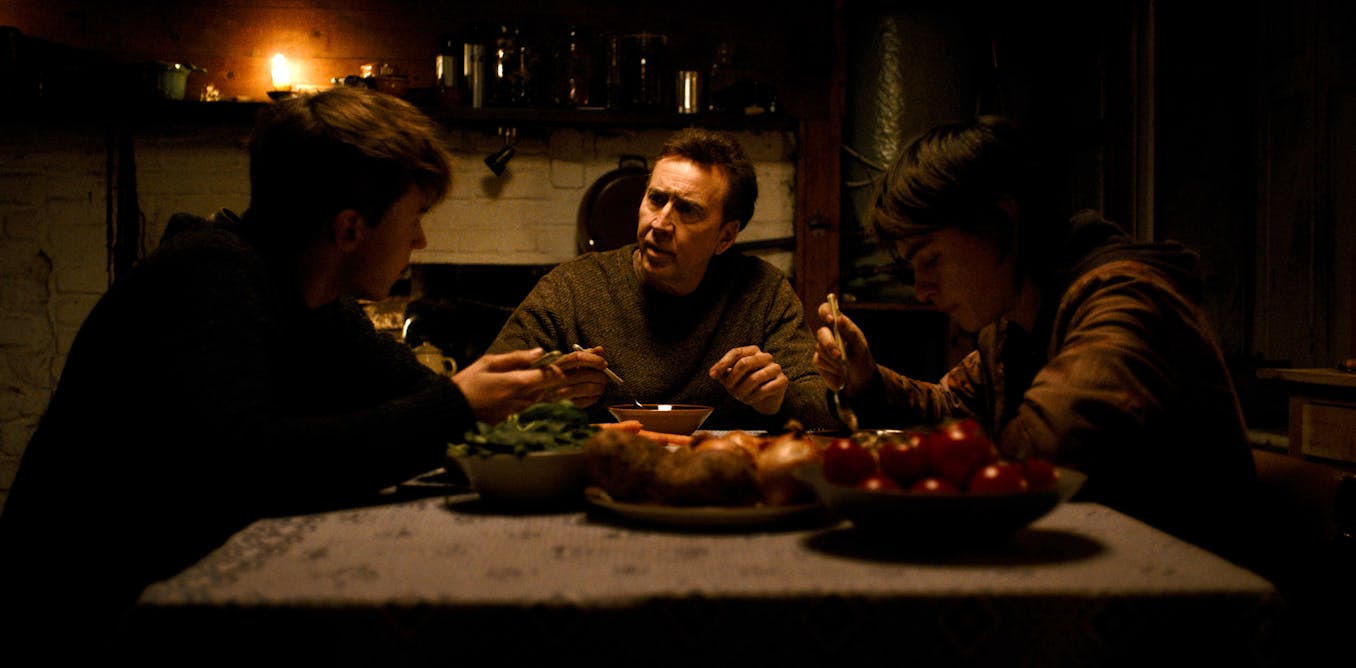Play all audios:
In her 1965 essay, The Imagination of Disaster, critic Susan Sontag wrote that: “The science fiction film … is concerned with the aesthetics of destruction, with the peculiar beauties to be
found in wreaking havoc, making a mess.” There is certainly beauty in director Benjamin Brewer’s new movie, Arcadian – but there is also, unfortunately, plenty of mess. Arcadian follows Paul
(Nicolas Cage) and his two teenage sons, Joseph (Jaeden Martell) and Thomas (Maxwell Jenkins), 15 years after some undisclosed calamity has befallen the planet. Although it is implied that
humans were to blame, the net result is that monsters now roam the countryside. During the day people are able to go about their business, but at night they must barricade themselves in
their homes. Paul and his sons live on an isolated farm and their only interaction with other survivors comes through Thomas’ burgeoning romance with Charlotte (Sadie Soverall), who lives in
a small community nearby. Their romance provides a great deal of the movie’s tension as Thomas takes several risks to pursue the relationship. One day, while rushing to return home before
sunset, he slips and needs rescuing. Paul saves the day – but at some cost. He is incapacitated, leaving the brothers to fend for themselves. Arcadian manages to be both highly derivative
and also quite unusual. It is part thriller, part horror and part creature feature (the creatures are odd, disturbing and easily the most memorable element in the movie). There’s even a bit
of body horror thrown in. In some regards, it can be compared to the 2019 adaptation of H.P. Lovecraft’s short story, Color Out of Space, which also starred Cage. The movie also shares
similarities with A Quiet Place (2018) in terms of its tense claustrophobia and, rather less fortuitously, with the science fiction horror Cloverfield (2008), from which it borrows shaky
handheld camerawork that I found quite offputting. Cage gives an assured and somewhat understated (for him) performance, and he’s ably supported by the cast of young actors. The movie does
play with some interesting ideas but, with a short run-time of around 90 minutes, they rarely go anywhere. Near the beginning of the movie, Paul and his sons are having dinner. Paul has to
intervene to stop their arguing – they are typical brothers, constantly at war with one another. “You wanna be animals?” shouts Paul. “Are we not men?” he asserts before plunging his knife
into the table. In an odd moment, the two boys repeat the gesture and the language. It immediately draws attention to the lack of women in the movie. But, aside from a pointed comment from
Charlotte, there’s little else to draw from this narrative thread other than concluding that the boys have too much testosterone. More interesting is the relationship between the two
brothers. The responsible brother, Joseph, is keen to learn and better understand the world around him. At one point he captures one of the creatures, intent on studying it. In an early
scene we see Joseph with a chess board in front of him, not playing but instead studying famous games. By contrast, Thomas, the irresponsible one, is more interested in play. He is, to all
intents and purposes, not a “man” after all, but a normal kid in abnormal circumstances. In one scene, as he tries to impress Charlotte, he juggles playfully with some toys before claiming
it as a trick that Joseph had taught him. Another “game” the two play frames the movie’s rather thin backstory. “Wanna play crappy apocalypse?” Charlotte asks, hoping to steal a few more
minutes with Thomas before he runs back home. This “play” involves trying to narrate, in just 10 seconds, what they imagine led to the apocalypse their families have survived. It seems safe
to assume that Cage’s Paul is the “arcadian” of the movie’s title, but this is also left unsaid. At one point he states that he believes (optimistically) that, post-apocalypse, the world is
getting cleaner. There’s a lovely shot of him resting by a waterfall. The daytime scenes in the movie have a serenity to them. This is the pastoral idyll to which the movie’s title alludes,
and to which Paul, presumably, longs to return. Without spoiling it, the ending of the movie also draws on these ideas of a return to nature. Only now, it is the young protagonists who offer
restoration in their search for a new arcadia. Brewer’s movie is timely, given its depiction of a post-apocalyptic world in which an appreciation of the natural world offers a way forward,
and given its perspective on the importance of family in troubled times. But, despite its occasional beauty, it largely misses its opportunity to say anything profound.

